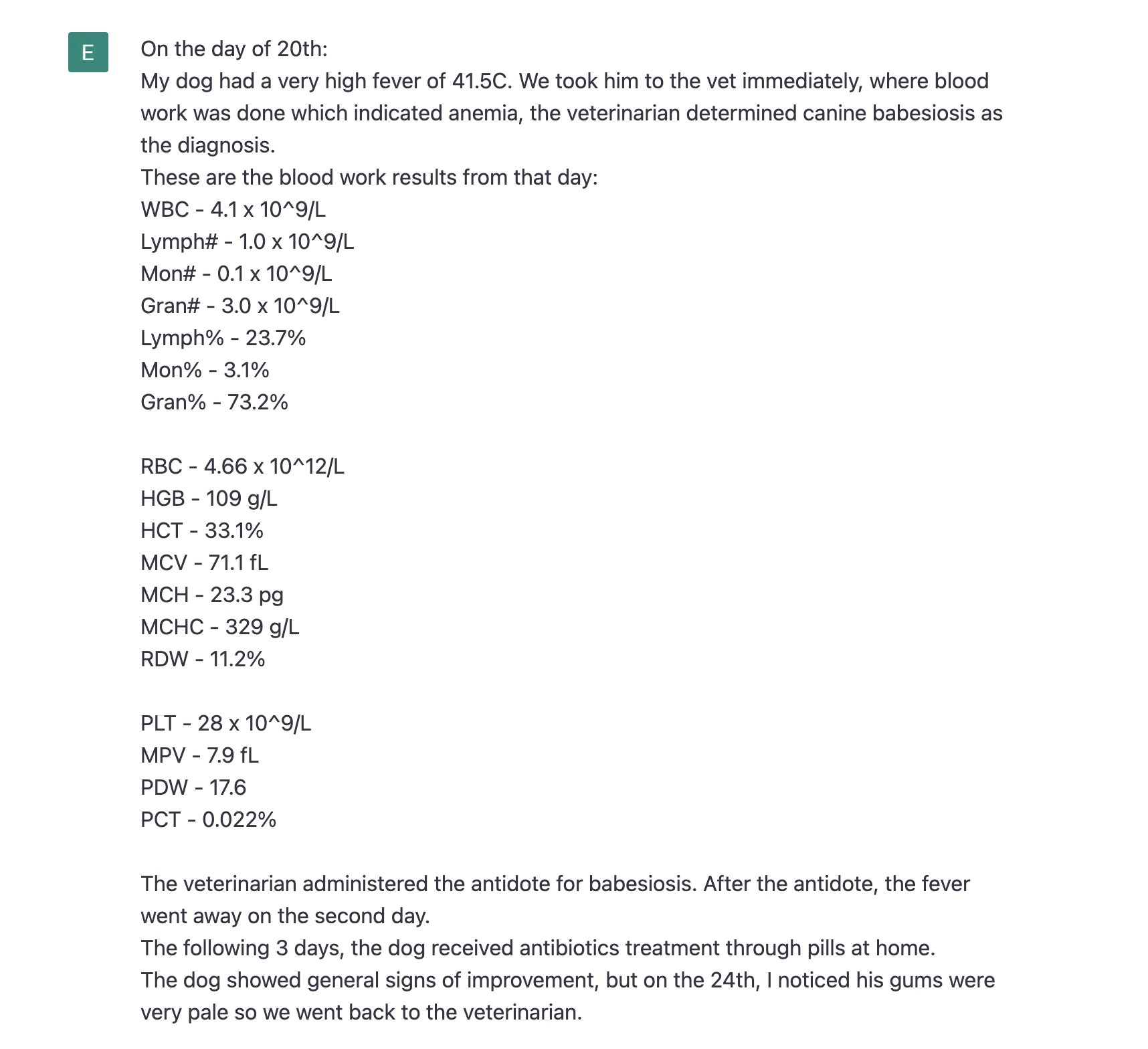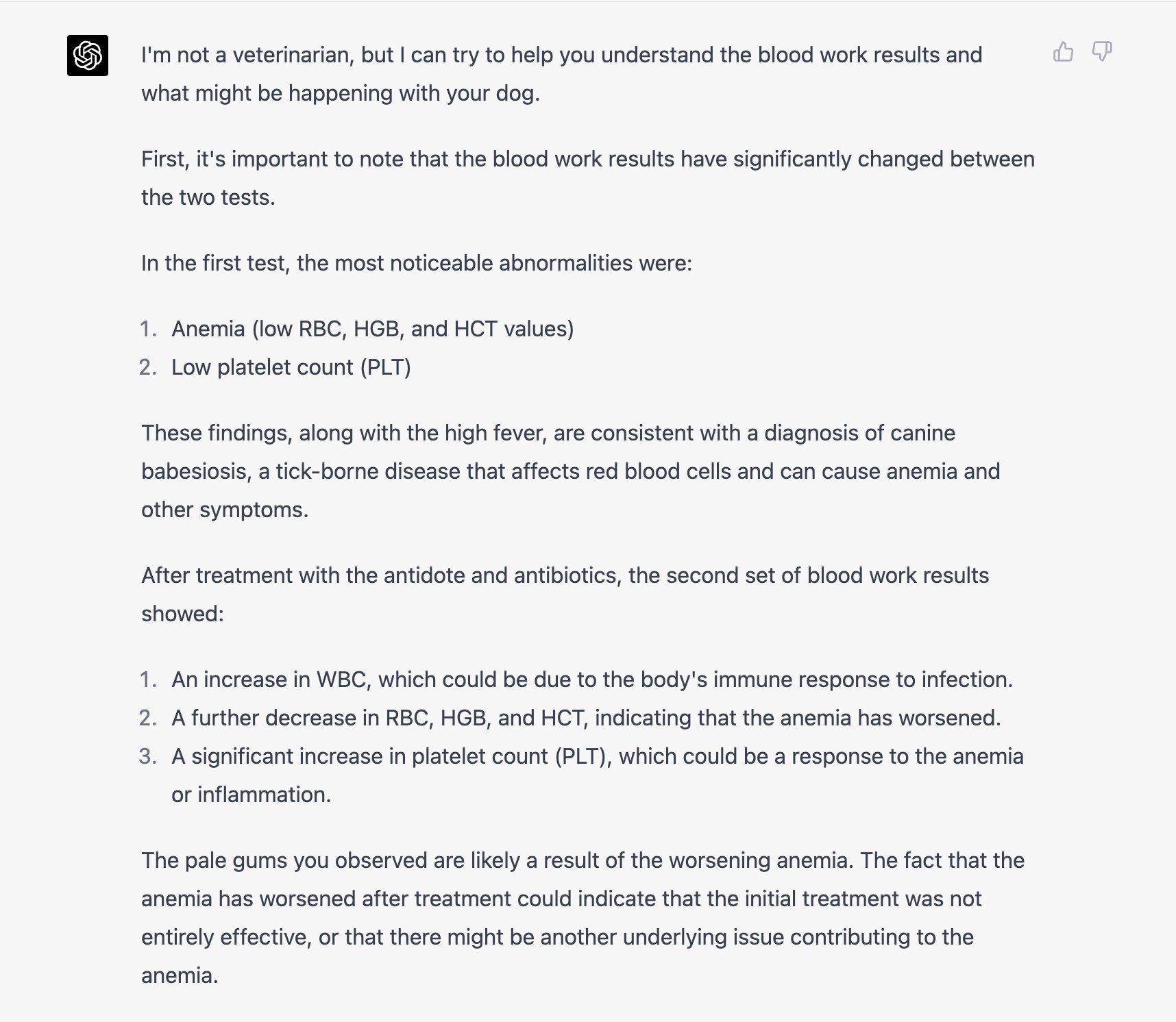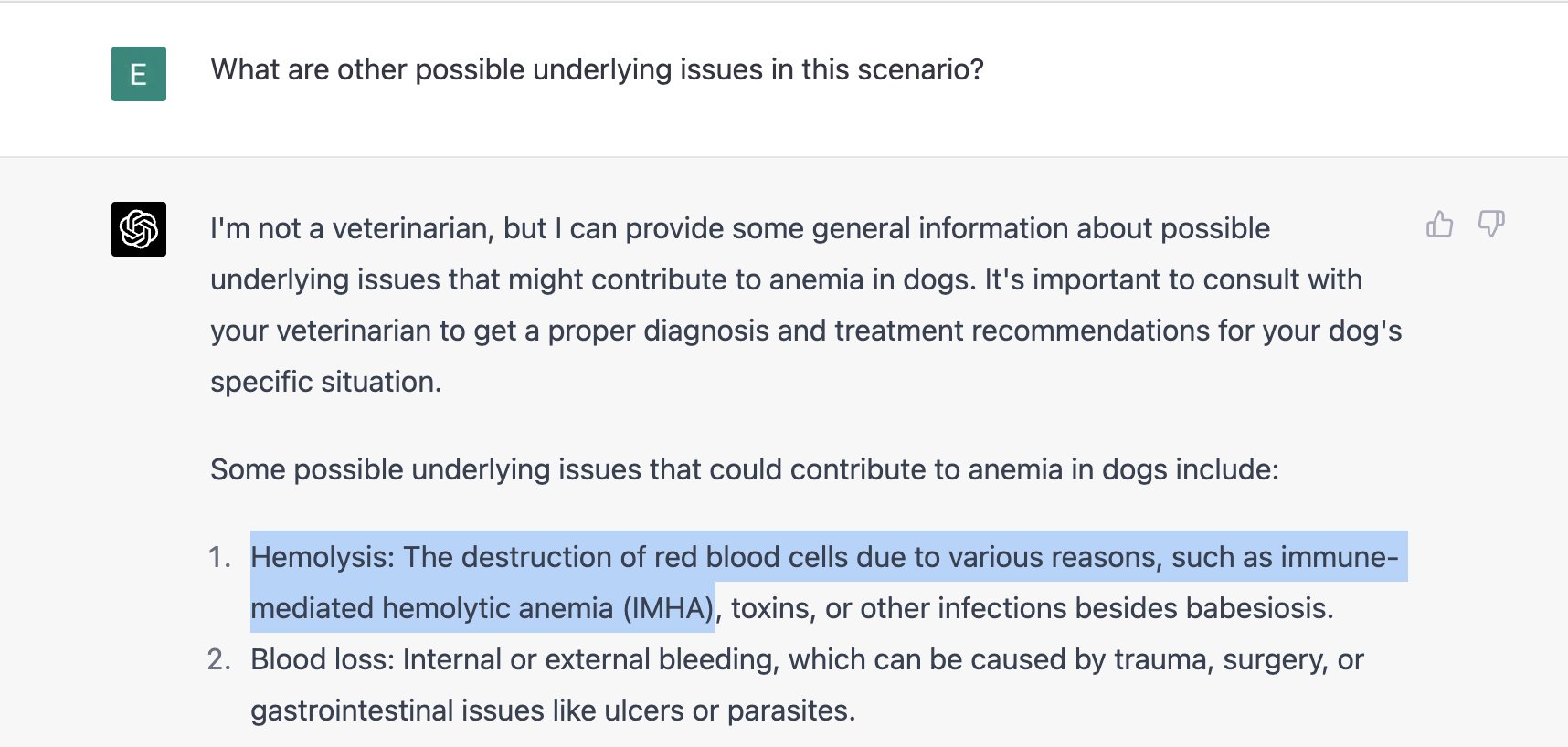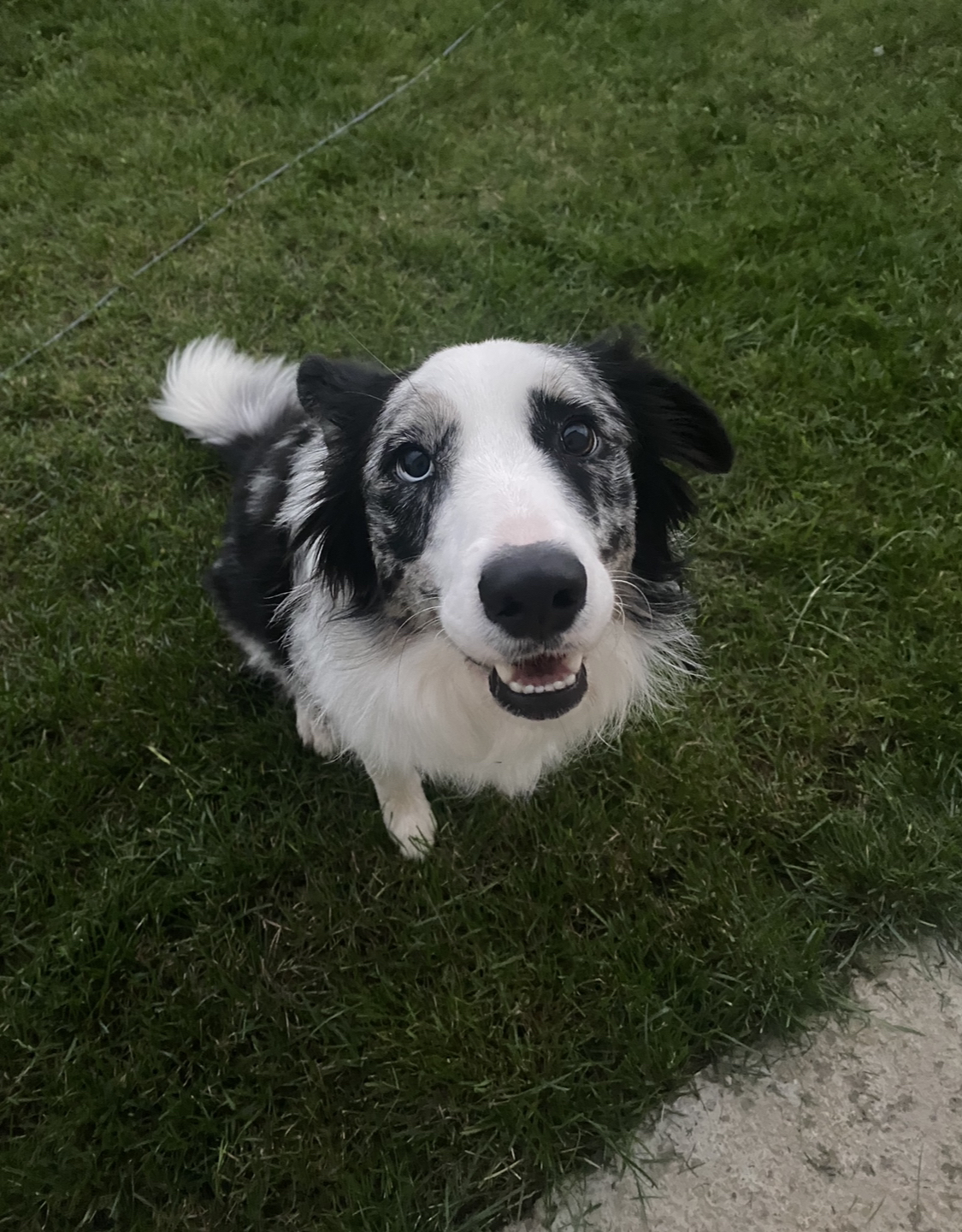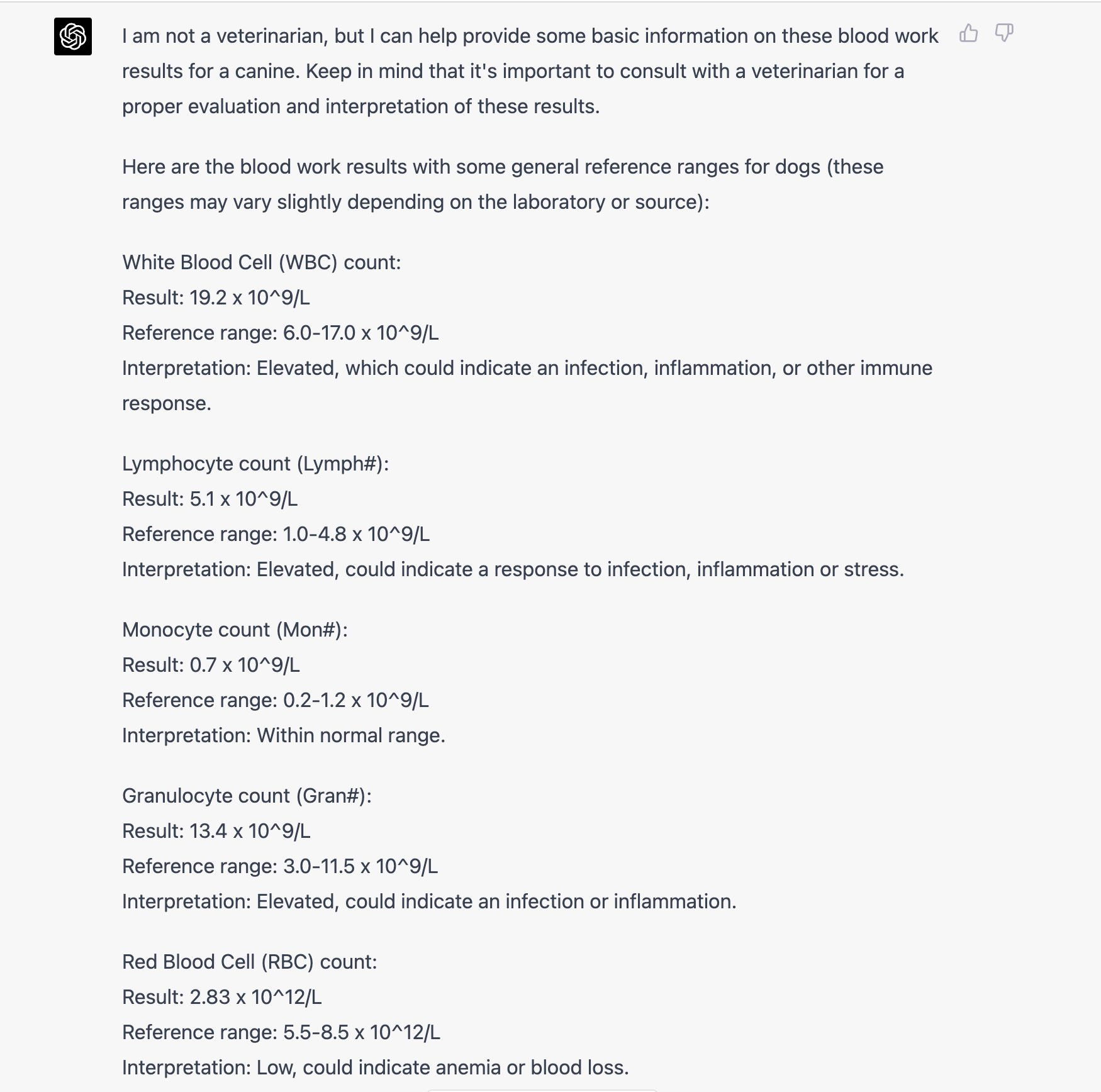Thread
#GPT4 saved my dog's life.
After my dog got diagnosed with a tick-borne disease, the vet started her on the proper treatment, and despite a serious anemia, her condition seemed to be improving relatively well.
After a few days however, things took a turn for the worse 1/
After my dog got diagnosed with a tick-borne disease, the vet started her on the proper treatment, and despite a serious anemia, her condition seemed to be improving relatively well.
After a few days however, things took a turn for the worse 1/
I noticed her gums were very pale, so we rushed back to the vet.
The blood test revealed an even more severe anemia, even worse than the first day we came in.
The vet ran more tests to rule out any other co-infections associated with tick-borne diseases, but came up negative 2/
The blood test revealed an even more severe anemia, even worse than the first day we came in.
The vet ran more tests to rule out any other co-infections associated with tick-borne diseases, but came up negative 2/
At this point, the dog's condition was getting worse and worse, and the vet had no clue what it could be.
They suggested we wait and see what happens, which wasn't an acceptable answer to me, so we rushed to another clinic to get a second opinion 3/
They suggested we wait and see what happens, which wasn't an acceptable answer to me, so we rushed to another clinic to get a second opinion 3/
In the meantime, it occurred to me that medical diagnostics seemed like the sort of thing GPT4 could potentially be really good at, so I described the situation in great detail.
I gave it the actual transcribed blood test results from multiple days, and asked for a diagnosis 4/
I gave it the actual transcribed blood test results from multiple days, and asked for a diagnosis 4/
Despite the "I am not a veterinarian..." disclaimer, it complied.
Its interpretation was spot on, and it suggested there could be other underlying issues contributing to the anemia 5/
Its interpretation was spot on, and it suggested there could be other underlying issues contributing to the anemia 5/
So I asked it what other underlying issues could fit this scenario, and it gave me a list of options.
I knew the 4DX test ruled out other coinfections, and an ultrasound ruled out internal bleeding, so that left us with one single diagnosis that fit everything so far: IMHA
6/
I knew the 4DX test ruled out other coinfections, and an ultrasound ruled out internal bleeding, so that left us with one single diagnosis that fit everything so far: IMHA
6/
When we reached the second vet, I asked if it's possible it might be IMHA.
The vet agreed that it's a possible diagnosis. They drew blood, where they noticed visible agglutination.
After numerous other tests, the diagnosis was confirmed. GPT4 was right. 7/
The vet agreed that it's a possible diagnosis. They drew blood, where they noticed visible agglutination.
After numerous other tests, the diagnosis was confirmed. GPT4 was right. 7/
We started the dog on the proper treatment, and she's made almost a full recovery now.
Note that both of these diseases are very common. Babesiosis is the #1 tick-borne disease, and IMHA is a common complication of it, especially for this breed. 8/
Note that both of these diseases are very common. Babesiosis is the #1 tick-borne disease, and IMHA is a common complication of it, especially for this breed. 8/
I don't know why the first vet couldn't make the correct diag., either incompetence, or poor mgmt.
GPT-3.5 couldn't place the proper diag., but GPT4 was smart enough to do it.
I can't imagine what medical diagnostics will look like 20 years from now.
GPT-3.5 couldn't place the proper diag., but GPT4 was smart enough to do it.
I can't imagine what medical diagnostics will look like 20 years from now.
The most impressive part was how well it read and interpreted the blood test results. I simply transcribed the CBC test values from a piece of paper, and it gave a step by step explanation and interpretation along with the reference ranges (which I confirmed all correct)
If @OpenAI needs more info for research purposes, I have Sassy's (the lucky dog) entire medical records and blood test results ready to share
@OpenAI Thread of entire process reaching the correct diagnostic, without any guidance or hinting from my side: simply stating facts and asking "what is the most likely?"
Mentions
See All
Arvind Narayanan @random_walker
·
Mar 26, 2023
Amazing thread. Reports of real-world utility, even anecdotal, are more informative to me than benchmarks. But there's a flip side. How many people put their symptoms into ChatGPT and got wrong answers, which they trusted over doctors? There won't be viral threads about those.
Joshua Gans @joshgans
·
Mar 26, 2023
This story Is pretty amazing.
